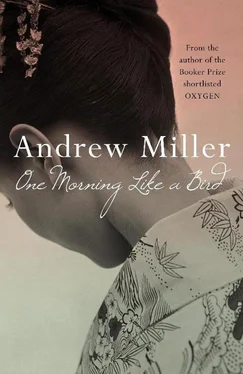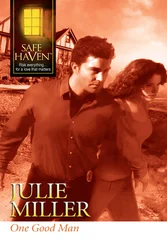And then, from no observable cause other than the slow accretion of new strength, he wakes out of a deep sleep, seventeen days after falling ill, and listens, with simple curiosity, to the noises of the street — the tofu-seller’s bugle, the play of wind chimes, the chattering of sewing machines and radios. He sits up. When the dizziness passes he drinks the water by his bed and washes the taste of medicine from his mouth. He dips two fingers into the glass and wipes his brow, his eyelids. He is setting the glass down again when he sees the marks on his hand, the scatter of ink scratches over the muscle at the base of his left thumb. He angles his hand to the light, then turns it so that his fingers point towards his chest. Is . . hi . . ha . .
Ishihara .
Ishihara!
It is a full minute before he can explain it to himself, can draw to the top of his mind the memory of Hideo Makiyama leaning across to him, pen in hand, under the slowly turning blades of the ceiling fan in the Don Juan. The intuition. The wonderful idea. He did not want Fritz Lang, or that troublesome neurasthenic Akutagawa. He certainly did not want Arthur Rimbaud (Arthur who?), with or without the mysterious letter. What was needed, what was long overdue, what he — and therefore the public — had a raging thirst for, was a comprehensive study of the young star of modern Japanese writing, the author whose books were read even by those who, strictly speaking, could not be called readers at all, who did not give a damn about ‘literature’ or the values of so-called educated people and who could only be spoken to by a man with a genius for simplicity. And this was his offer, this he would allow Yuji to attempt. And to seal the matter, to make some manner of contract between them, he had clutched Yuji’s fingers between his own and written, with a few quick darts of his pen, Ishihara’s name, an act so pointless, so entirely ludicrous, Yuji, his head already throbbing from the drink, had let the moment fall like spilt ash to the dark of the bar’s floor.
Cautiously, he stands up from the mattress. He puts a jacket round his shoulders and goes onto the platform. A fine rain is falling, and further off, in columns of blue shadow, a heavier rain is falling over the Low City. There is no one in the Kitamura Garden. In his own garden, Miyo is hurrying back from the privy, sheltering herself under an umbrella painted with irises. He holds out his hands. On his palms he feels each raindrop’s soft arrival. He should, he knows, attempt to be like rain, to have the same indifference and generosity. He also knows that by tomorrow he will have quite forgotten the wisdom of this.
Downstairs for the first time in three weeks, he sits in the calm of the Japanese room, sipping tea and waiting for the bath to fill. In the alcove, the scroll has been changed. The snow, the bowed pine trees, the men ascending, have been replaced with a painting of bush warblers on a branch of plum blossom.
The bath is so hot his body becomes numb. He lies there, fingering the soft fringe of ragged hair at his chin, his sick-man’s beard. The light of a spring day is slanting through the vent in the wall above him, a clear gold light that falls on the little bran sack Mother uses in place of soap. The season has moved on while he lay upstairs, the year has turned. He should be pleased, but the thought of going back, of starting again the struggle involved even in an existence like his . . is he ready for that? It is almost a relief when, standing up from the bath, he is swept by a sensation of profound weakness, so that for several seconds, as the light flickers and the water drips from his skin, he can do nothing but stand there, wavering between the elements.
The last of the night sweats give way to nights of honest sleep. His face, smooth-shaven again, loses its shadows. In weak sunshine he takes strolls in the garden, little restorative circuits in which he breathes, as deeply as he can, the ripening air. He is out there one afternoon, reading on the stump of the old pine tree they cut down in Showa 10, when the phone rings and Miyo calls him from the verandah. When he takes the receiver and offers his tentative ‘ Moshi-moshi ’ he cannot quite identify the woman’s voice.
‘But it’s me ,’ she says, switching into French. ‘Don’t you know my voice yet?’
‘You’ve never called me before,’ he says.
‘Do I sound so different on the telephone?’
‘A little, perhaps.’
She speaks to him in Japanese again, the usual mix of Tokyo polite-style and something more direct, more blunt, more definitely Alissa Feneon. She tells him how Junzo came to the house with a book he had promised her (‘one of those impossible volumes of philosophy he always has his nose in’), and how it seemed no one had seen Yuji or heard from him in weeks. Had his winter illness come?
‘Yes,’ says Yuji, ‘it came.’
‘But you have recovered now?’
‘There has been an improvement.’
‘You don’t sound ill.’
‘Would you like to hear me cough?’
‘No,’ she says. ‘I don’t want that, of course.’
There’s a pause. He waits. He cannot begin to imagine why she has called him. He is not even sure where she found his telephone number. Could she have asked Junzo for it?
‘I was going to mention something,’ she says.
‘Yes?’
‘If you would like to go to the kabuki .’
‘To the kabuki ?’
‘To see Kasane . Do you know it?’
‘It’s a ghost story,’ he says. ‘Everyone knows Kasane .’
She explains to him that Mrs Yamaguchi, her dance teacher, has been assisting a company of young actors who, though amateurs, are, in Mrs Yamaguchi’s view, both talented and dedicated. Their speciality is the staging of performances in the old style, such as might have been seen in the days of the first Nakamura. They do not, for example, use any electric lighting.
‘I see,’ says Yuji, half fearful this is some sort of game. ‘So it’s kabuki in the old style.’
‘Mrs Yamaguchi will be going. And she has given some tickets to her students. I have two.’
‘Two?’
‘Yes.’
‘To Kasane ?’
‘Yes,’ she says. ‘Why do you keep repeating everything?’
‘I’m sorry . .’
‘It doesn’t matter,’ she says. ‘You’ve been ill. You probably haven’t been speaking to people.’
‘No.’
‘So you’ll come?’
‘When?’
‘Tomorrow.’
‘Tomorrow!’
‘We could meet at the house at five, then take a taxi. The theatre’s in Tsukiji.’
‘Ah, Tsukiji . .’
‘I thought you might find it amusing, especially as you’ve been unable to leave the house for so long. Aren’t you bored to death?’
What, he wonders, what form of words, would make her understand that he would rather spend the evening grinding chalk between his teeth than go to a student performance of kabuki ? Why has she chosen him? What does she want? It is highly irritating that she refuses to translate his hesitation into what it so obviously signifies.
‘At five o’clock?’
‘You could wear a kimono,’ she says, ‘if you think you remember how to.’ And she laughs, a sound like someone throwing petals in his face. He hangs up. Miyo is eavesdropping in the Western room. Haruyo, he supposes, will have heard everything from Mother’s room — Mother too, perhaps. He goes upstairs, lies on his mattress. Is she, perhaps, a little crazy? He has known her since she was sixteen, but other than Garbo, Dietrich, Bette Davis, Vivian Leigh, Danielle Darrieux and a few others, he has no one to compare her with. He has seen other foreign women, of course, has surreptitiously studied them, their height, their high colour, their colourful eyes, their interesting hair, but it is only Alissa he has had any dealings with, just as her father is the only foreign man he has ever spoken to. What is her interest in kabuki ? What is her interest in classical dance — a form not even Japanese people take much notice of? Can she not be satisfied with Molíère and waltzes?
Читать дальше












